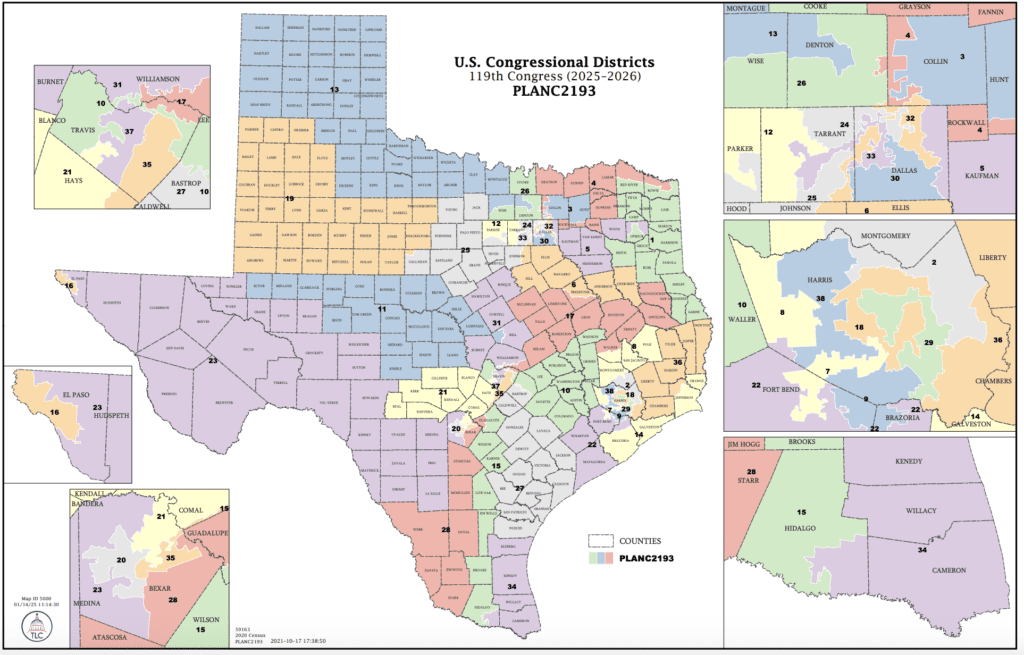Texas Gov. Greg Abbott has added congressional redistricting to his agenda for the upcoming special legislative session, citing constitutional concerns raised by the U.S. Department of Justice about four racially gerrymandered districts in the state.
A July 7 letter from the DOJ Civil Rights Division to Abbott and Attorney General Ken Paxton urged the state to rectify “race-based” considerations used to create the specified districts or face legal action.
According to the DOJ, the districts “are nothing more than vestiges of an unconstitutional racially based gerrymandering past, which must be abandoned, and must now be corrected by Texas.”
The targeted districts—three in the Houston area and one in Dallas-Fort Worth—are majority-minority “coalition districts” currently held by Democrats.
A federal court ruling last year in a Galveston County redistricting case established that districts based on “coalitions” of different minority groups are not protected by the Voting Rights Act, opening the door for Texas to revisit its electoral district maps.
President Donald Trump’s team began floating the redistricting idea earlier this year.
Redrawing the congressional district maps ahead of the 2026 mid-term elections could help the GOP maintain a majority in the U.S. House and continue Trump’s America First agenda.
Such a boost would require shifting Republican voters from GOP-held areas while maintaining the party’s majority in those districts. A 2019 U.S. Supreme Court decision cleared the way for redistricting based on party affiliation.
The Republican-Democrat split in the U.S. House is 220-212, with three vacant seats previously held by Democrats.
Republicans currently hold 25 of Texas’ 38 U.S. House seats, while Democrats hold 12 seats. One traditionally Democrat seat is vacant and is targeted for redistricting.
Normally, election districts are redrawn every 10 years to reflect population changes recorded by the decennial census, but redistricting may also be done at other times.
After state lawmakers chose not to take up the issue during their regular legislative session, Texas Republicans urged Abbott to add redistricting to a special session agenda.
Abbott’s agenda for the upcoming special session calls for revisions to Texas’ congressional maps “in light of constitutional concerns raised by the U.S. Department of Justice.”
The DOJ identified four Texas congressional districts that currently constitute unconstitutional coalition districts:
- TX-09 in Harris and Fort Bend counties—held by Democrat U.S. Rep. Al Green
- TX-18 in Harris County—vacant, previously held by Democrats
- TX-29 in Harris County—held by Democrat U.S. Rep. Sylvia Garcia
- TX-33 in Dallas and Tarrant counties—held by Democrat U.S. Rep. Marc Veasey
Coalitions almost always result in Democrat districts.
“It is the position of this Department that several Texas Congressional Districts constitute unconstitutional racial gerrymanders, under the logic and reasoning of Petteway [the Galveston County redistricting case],” the DOJ letter stated.
Specifically, the record indicates that TX-09 and TX-18 sort Houston voters along strict racial lines to create two coalition seats, while creating TX-29, a majority Hispanic district. Additionally, TX-33 is another racially-based coalition district that resulted from a federal court order years ago, yet the Texas Legislature drew TX-33 on the same lines in the 2021 redistricting. Therefore, TX-33 remains as a coalition district.
Although the State’s interest when configuring these districts was to comply with Fifth Circuit precedent prior to the 2024 Petteway decision, that interest no longer exists. Post-Petteway, the Congressional Districts at issue are nothing more than vestiges of an unconstitutional racially based gerrymandering past, which must be abandoned, and must now be corrected by Texas.
“If the State of Texas fails to rectify the racial gerrymandering of TX-09, TX-18, TX-29 and TX 33, the Attorney General reserves the right to seek legal action against the State, including without limitation under the 14th Amendment,” concluded the letter signed by Harmeet Dhillon, assistant attorney general for the Civil Rights Division.
Galveston County Judge Mark Henry called the move toward ending Democrats’ misuse of racial gerrymandering in Texas “a testament to what happens when conservatives fight back.”
“Galveston County fought the Biden DOJ and won. Our David vs Goliath victory in the 5th circuit will forever change the political landscape of Texas and may ultimately determine the fate of who controls Congress in the 2026 midterms and beyond,” Henry posted to social media on Thursday.
The Republican Party of Texas hailed Abbott’s inclusion of redistricting on his special session agenda as “an essential step in preserving GOP control of Congress and advancing President Trump’s America First agenda.”
The special session starts July 21 and can last up to 30 days.
The governor controls the agenda, which, as announced Wednesday, contains 18 items.
Abbott may add items to his agenda at any time before or during the session.
No ads. No paywalls. No government grants. No corporate masters.
Just real news for real Texans.
Support Texas Scorecard to keep it that way!






